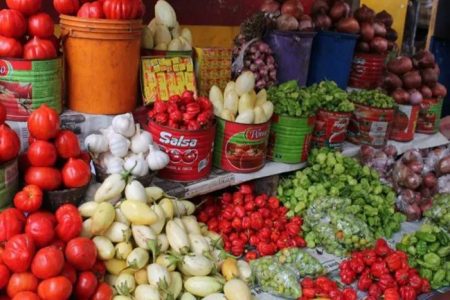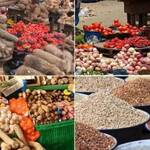The inflation rate in Ghana has surged to 23.8% in December 2024, marking the fourth consecutive monthly increase and the highest rate since April 2024, according to the Ghana Statistical Service (GSS).
This development underscores the persistent economic challenges facing the country as prices for goods and services continue to climb.
Consumer Price Index reaches new heights
The Consumer Price Index (CPI) for December 2024 stood at 248.3, a clear reflection of the 23% year-on-year increase compared to December 2023.
Month-on-month inflation from November to December was measured at 1.8%, signaling a steady upward trend in prices across various sectors.
Food inflation drives the surge
Food inflation remains the dominant contributor to the rising rate, increasing to 27.8% in December, up from 25.9% in November. This 2.8% month-on-month jump highlights the strain on household budgets, as families grapple with escalating costs for essential goods.
Historically, food inflation has averaged 15.15% from 2013 to 2024.
However, its dramatic fluctuations—reaching an all-time high of 61% in January 2023 and a record low of 5% in July 2014—underscore the volatility of this sector.
Non-food inflation shows slower growth
Non-food inflation presented a more moderate increase, with rates declining slightly to 20.3% in December from 20.7% in November.
While this signals some stabilization in non-food product prices, it remains a significant contributor to the overall inflation rate.
Locally produced goods bear the brunt
A notable disparity was observed between locally produced and imported goods.
Inflation for locally produced items surged to 26.4%, reflecting challenges in domestic production and supply chains.
By comparison, inflation for imported goods stood at 17.9%, showcasing a relatively subdued rise in prices for foreign products.
This contrast points to the inefficiencies in local production, further exacerbated by rising costs and limited supply chain resilience.
Impacts on Ghana’s economy and households
The inflation rate of 23.8% significantly exceeds the central bank’s target range of 6% to 10%, highlighting ongoing economic instability.
While it remains below the peak of 61% in January 2023, the current rate paints a troubling picture for Ghanaian households and businesses.
With food prices climbing steadily, families face mounting difficulties in affording basic necessities.
For businesses, rising costs threaten profitability and operational stability, potentially slowing economic growth.
Economic outlook: A call for action
Economists emphasize the need for targeted policies to address inefficiencies in local production and stabilize supply chains.
The stark contrast between local and imported goods inflation underscores the importance of bolstering domestic industries to reduce dependency on imports.
As Ghana enters 2025, managing inflation will remain a top priority for policymakers.
Effective fiscal and monetary measures are essential to easing the financial burden on citizens, restoring confidence in the economy, and fostering long-term stability.
The government’s ability to navigate these challenges will determine the economic trajectory of the nation in the coming year.
- Have we reaped the whirlwind? - 19 April 2025
- Fighting cocaine with the cross - 18 April 2025
- Galamsey, Cocaine: of truths, errors and the priest - 18 April 2025

